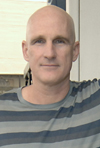World’s experts gather online
BU cultivates a corner of the Digital Universe

A team of researchers and writers from BU’s Center for Energy and Environmental Studies is helping to build what some visionaries hope will be the largest and most authoritative source of human knowledge ever assembled. Led by the center’s director, Cutler Cleveland, a College of Arts and Sciences geography professor, the team has pulled together more than 400 expert-authored articles that will constitute much of the Earth Portal, one of 40 portals that will make up a vast new Internet directory called the Digital Universe.
The directory, which launched in pilot form last week, is the brainchild of Joseph Firmage, a technology entrepreneur who is well-known in Internet circles for founding grand and well-intentioned enterprises. His current project, which is being built by a group of scientists, academics, and nonprofit groups, is both. Astrophysicist and former NASA researcher Bernard Haisch, who is president of the nonprofit Digital Universe, predicts that over the next several years, it will grow to be “the largest repository of credible information.”
Cleveland, editor in chief of the Earth Portal’s Encyclopedia of Earth, was drawn to the project through his involvement with the National Council for Science in the Environment, a nonprofit group that hopes to improve science-based environmental decision making.
“I was invited to it, and I was interested,” says Cleveland. “I was thinking that this will be a next-generation mode of using the Web to improve access to trusted, authoritative information.”
As chair of the project’s Environmental Information Coalition, Cleveland worked to develop the standards and rules that would determine who would be allowed to contribute to the Earth Portal and who the group should try to recruit. “Ultimately,” he says, “this is one big massive mobilization. There will be thousands of scientists, experts, educators, and other professionals.”
At least three more of those experts have an academic home at Boston University. Tom Kunz, a CAS biology professor and one of the world’s foremost experts on bats, has contributed an article, as have Robert Kaufmann of the Center for Energy and Environmental Studies, also a CAS geography professor, and Ranga Myneni, a professor in the Climate and Vegetation Research Group of the geography department.
Cleveland believes that the expertise of contributors and the authority of content will distinguish the Digital Universe from other contributor-assembled Web sites. He and his team intend to formally launch the Earth Portal when they have 1,000 articles, a benchmark that Cleveland hopes to reach in March.
Funded by $10.5 million from foundations and private investors, the Digital Universe will be free to all users, and none of its content will be sponsored by advertisers. Backers of the enterprise hope to eventually earn money by selling premium services such as chat rooms, videos, and books.
